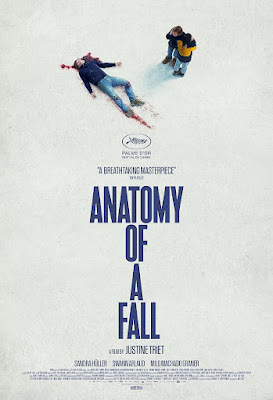Whodunit –and Why? “Anatomy of a Fall”

Having just seen, at longlast, the classic courtroom drama Anatomy of a Murder, I couldn’t resistchecking out a new French film with a deliberately similar title, Anatomy ofa Fall. (In the original French, it’s Anatomie d’une chute).This Justine Trier film, which took top honors at this year’s Cannes FilmFestival, also focuses on a emotionally fraught murder trial. But the emphasishere is less on cunning legal maneuvering than on the complex question ofmotive. Exactly what, we wonder, is behindthe sudden death of a man in the prime of life?
One of the pleasures ofwatching foreign movies is discovering actors for whom you have no priorassociations. The blonde and slightly zoftig German actress at the center of Anatomyof a Fall, Sandra Hüller, was brand-new to me. (No, I never saw Toni Erdmann, for which she wonseveral awards back in 2016.) In the French film she’s a successful novelist who’salso a wife and mom. I sensed that, as portrayed by Hüller, she’s an amiable presence within her picturesquemountain community, coolly self-possessed, someone well suited to shrugging offthe disturbances of domestic life. Her seemingly mild, calm personality tendedto put me on her side from start to finish. I might not have regarded her sounconditionally if I’d seen Hüller’s second film this past year, The Zone ofInterest. She has just received a Gotham Awards nomination for this German-languagemovie, in which she plays the supportive wife of the Nazi commandant ofAuschwitz.
The film critics of the LosAngeles Times, big fans of this film, have noted that it was written by adomestic team: Justine Triercollaborated with her longtime romantic partner, Arthur Harari, on the script.Since the couple has two children together, they are surely well aware of thestresses and strains within even the most successful marriage. They insist theyhave never been tempted to kill one another, but their script contains a keyscene, introduced as a recording in the courtroom, that bluntly underscores theanger that can arise between two marrieds (one a successful writer and one stillstruggling at the craft) who discover they are not always on the same page.
A key character in thetriangle of sorts that is their marriage is their pre-teen son, Daniel. Atragic accident a few years back has left him essentially blind, but despitethis challenge he’s a keen observer of his surroundings. His father’s fatalfall from a window in their rustic chalet’s attic puts Daniel in the terribleposition of having to choose sides. As we learn, Daniel’s parents responded tohis permanent disability in characteristic ways. His father, who deeply felt (unwarranted)guilt about the lead-up to the accident, chose to devote himself wholeheartedlyto the boy, including sidestepping his own ambitions to tutor Daniel full-timeat home. His mother, in line with herpragmatic approach to life,, has been matter-of-fact about his changedcircumstances and has trusted him to make his own way through the crisis. Nowthat Daniel’s father is dead and his mother is on trial for his murder, it’s upto Daniel to figure out (with the help of a dog named Snoop) what he believeshappened. Young Milo Machado Graner shines in this tricky role. He’s a pleasureto look at (where do filmmakers find these beautiful kids?), and when hischaracter takes center stage in that courtroom, he’s more than ready for hisclose-up.
Beverly in Movieland
- Beverly Gray's profile
- 10 followers



